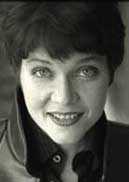![]()
![]()
Photos by Tom Bricker
Versatile Vocalist Pam Bricker Dies at 50
By Adam Bernstein
Washington Post Staff Writer
Monday, February 28, 2005; Page B04
Pam Bricker, 50, an eclectic singer whose repertoire ranged from playful jazz interpretations to her ethereal vocals for the electronica group Thievery Corporation, was pronounced dead Feb. 21 at her home in Takoma Park.
A spokeswoman for the Maryland medical examiner's office said that Ms. Bricker hanged herself and that the death was ruled a suicide. Ms. Bricker's husband, Gareth Branwyn, said his wife struggled with clinical depression.
|
Ms. Bricker was a presence in the Washington music scene since the early 1980s, when she joined the swing vocal group Mad Romance. That provided an enduring musical partnership with founder Rick Harris and led to several well-reviewed albums. She played at clubs with such notable musicians as guitarist Charlie Byrd, taught at George Washington University's jazz department and, in recent years, joined Thievery Corporation. Her best-known Thievery recording was "Lebanese Blonde," which appeared on the Grammy Award-winning soundtrack for the 2004 film "Garden State." |
|
Thievery Corporation brought her the worldwide notice and booking schedule for which she had longed. She toured European clubs and festivals and was pleased to find an audience that did not view her as, she often put it, "a living jukebox" providing background sounds in a bar.
Ms. Bricker's early musical life was filled with disappointments, which fueled her insecurities. She had a nervous breakdown at age 25 after being told by a recording executive that she was "a little bit old" to start her music career.
After a period of withdrawal -- "I hated music and all art" -- she slowly nursed her way back to performance, first as a guitarist and then as a singer. In one of her earliest engagements in Washington, at the Shoreham Hotel, the jazz critic W. Royal Stokes noted her "remarkable [vocal] range, excellent control and impressive rhythmic surety."
Frequently nominated for Washington Area Music Association honors, she won five times: as best contemporary jazz vocalist in 1999, 2000 and 2001; best contemporary jazz album in 2001 for her release "U-topia," named after the District club where she sang; and, with Harris, for best duo or group in 1993.
Pamela Carroll Bricker was born in Richmond and raised in Summit, N.J. Her father was a research psychologist who played trombone on the side. Her stepfather was a trombonist who had played with Woody Herman's band.
Ms. Bricker played piano and clarinet as a child, and her siblings played other instruments. Her mother suffered from manic depression and was later institutionalized, a fact that haunted her.
Ms. Bricker described herself as a "loner" as a young child, but music brought her pleasure. She attended ballets in New York, saw Broadway musicals, went to Jimi Hendrix concerts and was infatuated with the Beatles.
She attended Hampshire College in Massachusetts and fell in love with a music teacher, who introduced her to classical composers, Duke Ellington and the Randy Newman composition "You Can Leave Your Hat On."
"The sort of perverse sexuality of that tune, for me as an 18-year-old, that was the cat's meow," she told Stokes, who profiled Ms. Bricker in his new book "Growing Up With Jazz."
She read B.F. Skinner's "Walden Two" when she was 12 and later left college for a semester to research a paper on utopias. She traveled to the Twin Oaks commune in Louisa, Va., which was known for producing rope hammocks.
"I lived there for 2 1/2 years until I was just sort of overwhelmed by the desire to become a musician," she told a reporter. She alternated between Massachusetts and Virginia, auditing classes, singing in coffeehouses and working her way into the Copley Plaza Hotel lounge in Boston. She returned to Twin Oaks after her nervous breakdown.
In 1981, she settled in the Washington area with Branwyn, a freelance technical writer whom she met at the commune. With her guitar, she was soon playing folk-heavy music at a health food restaurant called Food for Thought, where she met Mary Chapin Carpenter.
"We got together a few times to sort of jam and pick and grin, and then she became the world's most famous folk and country crossover artist," she told Stokes.
Increasingly interested in jazz, she began expanding her songbook. After Harris spotted her at Charlie's Georgetown, they formed Mad Romance, which played at Blues Alley, the Monterey Jazz Festival and the Blue Note in New York. After the group disbanded in 1987, she and Harris continued to sing duets at area clubs and made several inventive, sprightly albums.
A musical restlessness persisted, though, and she later moved in other directions.
"As the '90s wore on," she told Stokes, "I felt an urge to break out of such a straight-laced jazz frame of mind and repertoire. I said: 'Jazz, like crime, doesn't pay. You have to mix it up and modernize it.' "
Survivors include her husband, from whom she was separated, of Arlington; a son, Blake Maloof of Arlington; her father, Peter Bricker of Pine Knoll Shores, N.C.; a brother; and a sister.
© 2005 The Washington Post Company
